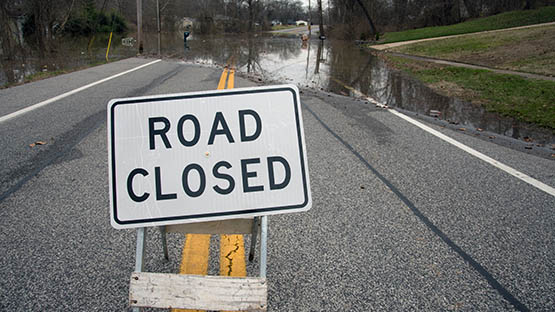
House Republicans are claiming that the Bipartisan Infrastructure Act is prioritizing the Green New Deal over new roads projects. A press release touting how a group led by Sixth District Congressman Ben Cline cites, through a link, as the source of the claim a memo from the Federal Highway Administration that doesn’t say that at all.
“The recently enacted Bipartisan Infrastructure Law (BIL), enacted as the Infrastructure Investment and Jobs Act (IIJA), Pub. L. 117-58 (Nov. 15, 2021), will deliver generational investments in our roads and bridges, promote safety for all road users, help combat the climate crisis, and advance equitable access to transportation,” the memo begins. “The BIL also presents the Federal Highway Administration (FHWA) with a unique opportunity: to exercise our stewardship and oversight responsibilities and evolve the century-old relationship with State departments of transportation and other stakeholders in a way that takes advantage of the tools Congress has provided and prioritizes investments that align with the underlying policies evident throughout the BIL to help our states and communities Build a Better America.”
The next line in the memo:
“This guidance is intended to serve as an overarching framework to prioritize the use of BIL resources on projects that will Build a Better America. The intent of the guidance also is to ensure that the funding and eligibilities provided by the BIL will be interpreted and implemented, to the extent allowable under statute, to encourage States and other funding recipients to invest in projects that upgrade the condition of streets, highways and bridges and make them safe for all users, while at the same time modernizing them so that the transportation network is accessible for all users, provides people with better choices across all modes, accommodates new and emerging technologies, is more sustainable and resilient to a changing climate, and is more equitable.”
The memo then lists “investments and projects that align with the BIL and will help Build a Better America” as those that:
- improve the condition, resilience and safety of road and bridge assets consistent with asset management plans (including investing in preservation of those assets).
- promote and improve safety for all road users, particularly vulnerable users.
- make streets and other transportation facilities accessible to all users and compliant with the Americans with Disabilities Act.
- address environmental impacts ranging from stormwater runoff to greenhouse gas emissions.
- prioritize infrastructure that is less vulnerable and more resilient to a changing climate.
- future-proof our transportation infrastructure by accommodating new and emerging technologies like electric vehicle charging stations, renewable energy generation, and broadband deployment in transportation rights-of-way.
- reconnect communities and reflect the inclusion of disadvantaged and under-represented groups in the planning, project selection and design process.
- direct Federal funds to their most efficient and effective use, consistent with these objectives.
Here’s how the memo concludes:
“Working together, we can make investments and deliver projects that upgrade the condition of streets, highways, and bridges and make them safe for all users, while at the same time modernizing them so that the transportation network is accessible for all users, provides people with better choices across all modes, is more sustainable and resilient to a changing climate, and is more equitable. FHWA is committed to increasing our level of coordination with metropolitan planning organizations, State departments of transportation and other stakeholders and decisionmakers including local and tribal governments that have not traditionally had access to needed Federal funds to ensure these goals are fully realized.”
There’s an awful lot in there about roads, and the stuff that isn’t directly about roads is about making sure roads are either built or improved with environmental considerations in mind.
There doesn’t appear to be much of anything there from the Green New Deal.
Anyway, we have quotes from Cline and three other House Republicans claiming otherwise.
“During a time of 40-year high inflation, a crippling supply chain, and higher prices of goods and services, the Biden administration is prioritizing infrastructure funds for Green New Deal projects over highway expansion. Americans need transparency from this administration to ensure their tax dollars are being properly used,” Cline said.
“The American people deserve to know if President Biden is using taxpayer dollars to secretly implement liberal green new deal policies. I am glad to partner with Congressman Cline to protect taxpayers and demand transparency from this radical administration,” said Congressman Jim Banks (R-IN-03), Republican Study Committee Chairman.
“With families across the country continuing to deal with a supply chain crisis that has kept everything from baby formula to appliances off the shelves, the Biden Administration needs to get their priorities straight by focusing on what matters to the American people instead of wasting more dollars on a radical, far-left agenda,” said Congressman Brian Mast (R-FL-18).
“Not only is the Infrastructure Investment & Jobs Act ridden with Green New Deal priorities, but it does so at the expense of critical, traditional infrastructure such as highway capacity projects. As a result, rural communities dependent on surface transportation bear the brunt. The Biden Administration must be held accountable for this blatant effort to further the left’s climate agenda,” said Congressman Cliff Bentz (R-OR-02).
These guys are obviously outraged, but it seems that the outrage is misplaced.










